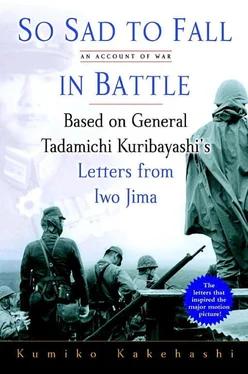Sadaoka was finally able to get to Iwo Jima in 1978, thirty-three years after Kuribayashi’s death. Iwo Jima was occupied by the United States for twenty-three years after the war, and Japanese citizens could not visit the island until after it was returned to Japan in 1968.
Sadaoka went to the island with a group on a memorial pilgrimage, and when the guide pointed out the command bunker where Kuribayashi is believed to have been based, he could not stop himself from rushing toward it.
“It’s me, your lordship. It’s me, Sadaoka,” he shouted at the top of his voice. “Here I am at last.”
A FEW DAYS AFTER I got back to Tokyo from Kôchi, I was in the library looking through newspaper articles from 1945 about the defeat at Iwo Jima, when I almost gasped aloud with surprise.
It was the Asahi Shimbun newspaper of March 22, 1945. On the front page was a large headline that read: “Iwo Jima Falls to the Enemy: Heroic Commander in Chief Stands at the Head of His Forces: All-Out Attack.” The article included Kuribayashi’s farewell telegram in its entirety, but it was different from what Sadaoka had recited from memory that day.
The battle is entering its final chapter. At midnight on the seventeenth, I will stand at the head of my men, and, praying for the certain victory and the security of the Imperial fatherland, all of us will resolutely carry out a heroic all-out attack.
I pulled out my notebook and checked my transcription of the telegram as Sadaoka had recited it to me. It began: “The battle is entering its final chapter. Since the enemy’s landing, the gallant fighting of the men under my command has been such that even the gods would weep.”
I was right. It was totally different.
Sadaoka looked the picture of robust health, but he was, after all, eighty-five years old. It wouldn’t be strange if his memory had played a trick on him. But when I remembered the resonant voice in which he had intoned the dispatch, I changed my mind: it wasn’t possible. After all, how could he possibly make a mistake about the last words of “his lordship”?
I had a sudden thought, and started looking for a book I was sure the library would have. It was the Senshisôsho , a series on the history of the war compiled by the Military History Department of the National Institute for Defense Studies in the postwar years. Regarded as the most detailed and objective record of the war, it is the so-called official published history. If the correct text of Kuribayashi’s farewell message was anywhere, it would be there.
And sure enough, there it was, on page 410 in volume thirteen of the sixty-eight volumes on the army: Chûbu Taiheyô Rikugun Sakusen 2 Periryû • Angauru • Iô-Jima ( “Mid-Pacific Army Operations 2: Peleliu, Angaur, Iwo Jima” ): “The battle is entering its final chapter. Since the enemy’s landing, the gallant fighting of the men under my command has been such that even the gods would weep….”
Sadaoka had not been wrong. What he had recited from memory that day had been almost perfectly correct. I then checked all the books written about Iwo Jima. Many of them quoted Kuribayashi’s farewell telegram, but in every case the text they used was the same as in the official published history. Perhaps Sadaoka had gotten his version from one of the books.
That had to mean that the text published in the newspapers had been altered.
But surely Kuribayashi, who had held Iwo Jima for over a month in the face of a ferocious American assault, was highly regarded by the military leadership? On the night of March 21, the prime minister, Kuniaki Koiso, made a speech on the radio about the last stand on Iwo Jima in which he praised Kuribayashi and the defense garrison for their “heroic resistance,” which was the “culmination of the Japanese spirit.”
Kuribayashi was also popular among the ordinary people. While few may know his name now, on countless occasions when I’ve asked people from the generation that lived through that time what they know about Iwo Jima, they instantly reply, “the great general Kuribayashi.”
So why then should there be any need to change the last words of such a famous man? Let’s compare both versions. First of all, here is Kuribayashi’s original message.
The battle is entering its final chapter. Since the enemy’s landing, the gallant fighting of the men under my command has been such that even the gods would weep. In particular, I humbly rejoice in the fact that they have continued to fight bravely though utterly empty-handed and ill-equipped against a land, sea, and air attack of a material superiority such as surpasses the imagination.
One after another they are falling in the ceaseless and ferocious attacks of the enemy. For this reason, the situation has arisen whereby I must disappoint your expectations and yield this important place to the hands of the enemy. With humility and sincerity, I offer my repeated apologies.
Our ammunition is gone and our water dried up. Now is the time for us all to make the final counterattack and fight gallantly, conscious of the Emperor’s favor, not begrudging our efforts though they turn our bones to powder and pulverize our bodies.
I believe that until this island is recaptured, the Emperor’s domain will be eternally insecure. I therefore swear that even when I have become a ghost I shall look forward to turning the defeat of the Imperial Army into victory.
I stand now at the beginning of the end. At the same time as revealing my inmost feelings, I pray earnestly for the unfailing victory and the security of the Empire. Farewell for all eternity.
I then looked at the text as published in the newspaper.
The battle is entering its final chapter. At midnight on the seventeenth, I will stand at the head of my men, and, praying for the certain victory and the security of the Imperial fatherland, all of us will resolutely carry out a heroic all-out attack.
I humbly rejoice in the fact that they have continued to fight bravely, since the enemy’s landing, against the enemy’s land, sea, and air attack of a material superiority such as surpasses the imagination, and the gallant fighting of the men under my command has been such that even the gods would weep.
One after another the officers and men are falling in the ceaseless and ferocious attacks of the enemy. For this reason, the situation has arisen whereby I must disappoint your expectations, and am forced to yield this important place to the hands of the enemy. With humility and sincerity, I offer my repeated apologies.
I believe that until this island is recaptured, the Emperor’s domain will be eternally insecure. I therefore swear that even when I have become a ghost I shall look forward to turning the defeat of the Imperial Army into victory. Our ammunition is gone and our water dried up. Now is the time for all the survivors to make the final counterattack and fight gallantly, conscious of the Emperor’s graciousness, not begrudging our efforts though they turn our bones to powder and pulverize our bodies.
At this point I together with all my officers and men reverently chanting banzais for the Emperor’s long life bid you farewell for all eternity. [Emphasis added.]
So how do the two versions differ?
In Kuribayashi’s original text, the first thing he talks about is the bravery of his men. By contrast, the altered text that was published in the newspapers emphasizes “the certain victory and the security of the Imperial fatherland,” rather than the soldiers themselves. Equally, the words “heroic all-out attack”—a commonly used expression at the time that served as a stock euphemism to beautify final suicide charges—do not appear in Kuribayashi’s message.
There are no major changes in the fifth paragraph of the text, except for the insertion of one phrase that does not appear in Kuribayashi’s original: “I together with all my officers and men reverently chanting banzais for the Emperor’s long life.”
Читать дальше












